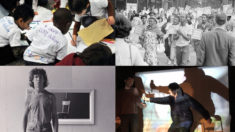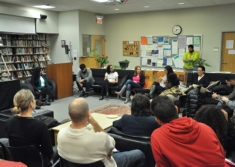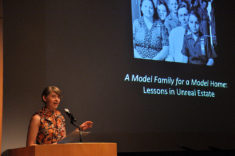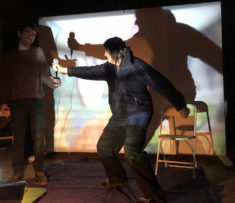About the application
CALL FOR APPLICATIONS (DUE November 18, 2016)
Teaching Fellows
The Center for the Humanities seeks 4 CUNY doctoral students (entering 3rd, 4th, or 5th year in fall 2017) who currently hold a Graduate Center fellowship in the humanities or the humanities related social-sciences to participate in the Seminar on Public Engagement and Collaborative Research.
Fellowship Description
This highly competitive fellowship offers a stipend and graduate assistantship (totaling $27,000) as well a flexible programmatic budget administered by the Center per year to promote cross-CUNY student engagement in public humanities-related projects as part of the seminar. The graduate assistant appointment will provide in-state tuition remission to students within their first 10 registered semesters of doctoral study at the CUNY Graduate Center. This teaching fellowship is for one year with an option to renew for a second; it will require a 15 hour per week commitment.
Teaching fellows will be expected to participate in weekly seminar meetings in spring 2017. The official fellowship begins in fall 2017. Fellows must teach at least one course per semester at a CUNY senior or community college during the grant period. Regular meetings set by research teams are mandatory for the duration of the seminar period. During the final semester of the fellowship, teaching fellows will work with digital fellows at the Center for the Humanities to reflect on and disseminate public research and teaching strategies developed through their pedagogical innovation.
ABOUT
What is the Seminar on Public Engagement and Collaborative Research?
The Seminar on Public Engagement and Collaborative Research is a two-year public humanities initiative generously funded by the Andrew W. Mellon Foundation. The seminar, which will run from spring 2017-spring 2019, builds on The Center for the Humanities’ successful pilot to promote the diverse ways the humanities function in public life as a public good. Bringing together a network of at least 38 faculty, students, and–uniquely–civic, cultural, and community partners, the seminar produces and circulates research through public projects, engaged scholarship, and interdisciplinary activities at the City University of New York and in New York City itself.
For more information about the kinds of projects produced by the pilot program, view here.
In order to activate a range of academic disciplines, the seminar is organized into four distinct research teams. The overall seminar and its four integrated research teams provide a tiered, networked structure to promote both broad inquiry into public research methodologies as well as focused scholarship on specific critical topics that bridge the arts and humanities, the digital humanities, the humanities-related social sciences, and social justice. Each research team (of 8-10 participants) is led by 2 faculty coleaders. The general themes to be refined and finalized by selected participants are:
· public education and racial (in)justice;
· music and sound (performance, creation, and scholarship);
· archives;
· histories of global contemporary art.
What is a public humanities project?
Some examples of collaboratively produced public projects include: archival research, intervention, and presentation; artworks; exhibitions; films; choreographic works and performances; classroom initiatives; translations; co-authored articles; public syllabi; workshops and classes; interpretive websites and interactive digital platforms; theatrical productions; books and publications; and community actions. In short, public projects are seated in serious scholarly research and connect communities working both inside and outside the university setting. For more information, view here.
Eligibility
- Doctoral student in the humanities or humanities-related social sciences at the Graduate Center, CUNY;
- Entering 3rd, 4th, or 5th year in fall 2017;
- Teaching experience in the senior or community colleges;
- Interest in public humanities methodologies and teaching practices;
- Hold a Graduate Center fellowship.
Fellowship Structure
Semester 1 (spring 2017):
Students will participate in weekly meetings and occasional professional development workshops as part of the Seminar on Public Engagement and Collaborative Research. This R&D period will help fellows develop public humanities curriculum.
Semester 2-4 (fall 2017, spring 2018, fall 2019): Students will continue to teach one course per semester. Students will join one of four research groups working under the rubric of the seminar to plan and promote collaborative public humanities projects - building relationships across CUNY and the city. In the classroom, students will establish meaningful ways to engage their own students in planned activities and incorporate public research practices into their curriculum.
Semesters 5 (spring 2019):
Students will have an opportunity to work alongside digital fellows and Center staff in order disseminate their methodological tool-kit. Select professional development and public and student engagement opportunities will continue.
Requirements
- Be making satisfactory progress towards their degree;
- Teach one class per semester at a senior or community college for duration of grant;
- Attend seminar meetings and occasional professional development workshops at the GC;
- Contribute to the Center for the Humanities blog (one blog entry per semester);
- Build and evaluate curriculum informed by public projects underway;
- Participate in, help plan, and promote public events generated by the seminar.
Application
Please send a letter of interest, a one-page proposal, and a CV to Kendra Sullivan at [email protected]. Details on what to include are below:
Your letter of interest should address the following:
+Please describe your teaching experience, including references to how you have successfully integrated public engagement into the curriculum.
+Please describe your pedagogical philosophy.
+What is your own scholarship about?
Your proposal should answer the following questions:
+ Which research theme aligns with your scholarship? (Identify one.)
Keep in mind that these areas are elastic frameworks, and your research might address any number of critical topics within these general themes through public scholarship.
They are:
public education and racial (in)justice;
music and sound (performance, creation, and scholarship);
archives;
histories of global art.
+ How will you braid research being developed through the seminar into the classroom?+ Describe your interest in joining the interdisciplinary seminar and working collaboratively.
+ How do you envision spending the funds provided to promote student engagement?
+ What are some primary goals and outcomes you hope to achieve?
Keep in mind that initial plans will evolve in dialogue with other participants.
Applications will be judged by a selections committee on: Scholarship; Creativity, Feasibility, Necessity, and Engagement.
Deadline
Due to the overwhelming response, this deadline has been extended to November 18, 2016.




